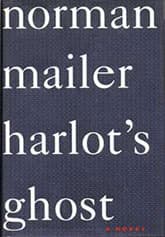Harlot's Ghost
Critique • Quotes
 First edition
First editionFirst publication
1996
Literature form
Novel
Genres
Literary, historical fiction, intrigue
Writing language
English
Author's country
United States
Length
Approx. 438,500 words
Page-turner runs out of pages
This is a great 600-page novel. Unfortunately it's 1,200 pages long.
No, that's unfair to Norman Mailer. In Harlot's Ghost he occasionally displays bouts of typical Mailer verbosity and falls back on his favourite writing ticks. (He has always liked double and triple negative constructions that send me for pencil and paper to diagram them.) And he does start the book with that sloppy grammatical error that critics pounced on.
But, for all its length, this may be one of Norman Mailer's most tightly written novels. This story of a CIA agent, who follows in his father's footsteps in the agency during the 1950s and 1960s, at times rivals Jean le Carré's classic espionage novels for combining intrigue with human frailty. It's a page-turner, particularly during the Berlin chapters when the protagonist is playing double-agent for two masters in the firm and during the build-up to the disastrous Bay of Pigs invasion of Cuba.
Other sections go on too long with seemingly little pay-off though. We keep expecting our hero to become disillusioned about the purpose of the CIA—that must be the point of the drawn-out dramas, we think. After all, the first part of the novel, taking place in 1984, shows what appears to be a final breakdown and flight to Russia, before flashing back to the early years.
But the character shows little progress toward this eventuality before we run up against the stunning words "To Be Continued".
The Communist menace
The "Harlot" of the title, by the way, is not what you might guess, knowing the sexual obsessions of the author. It's the nickname for our hero's male CIA mentor, whose wife he steals.
Mailer also shows tremendous discipline in creating a character who is completely different from himself. At a time when leftist Mailer was protesting against the American establishment, Harry is shown patriotically fighting the Communist menace. There is little of Mailer's usual pontification and no presentation of himself in this novel.
Nor is there any sign of satire here. The young man's beliefs and actions are portrayed with respect and integrity. Frankly, I don't know how Mailer can do it. The depth of detailed knowledge on numerous topics is also impressive.
Of course, whether one feels the exercise—the phrase tour de force truly applies in this case—is worthwhile might depend on how it all plays out in the conclusion, if there is one. I for one could hardly wait for the next 1,200 pages.
But it never came. And several years after Mailer's death, the continuation has never appeared. Perhaps the reviews which were mixed—although some prominent literary figures called it Mailer's masterwork—discouraged him from continuing it.
Too bad. It could have been a contender.
— Eric
Critique • Quotes

